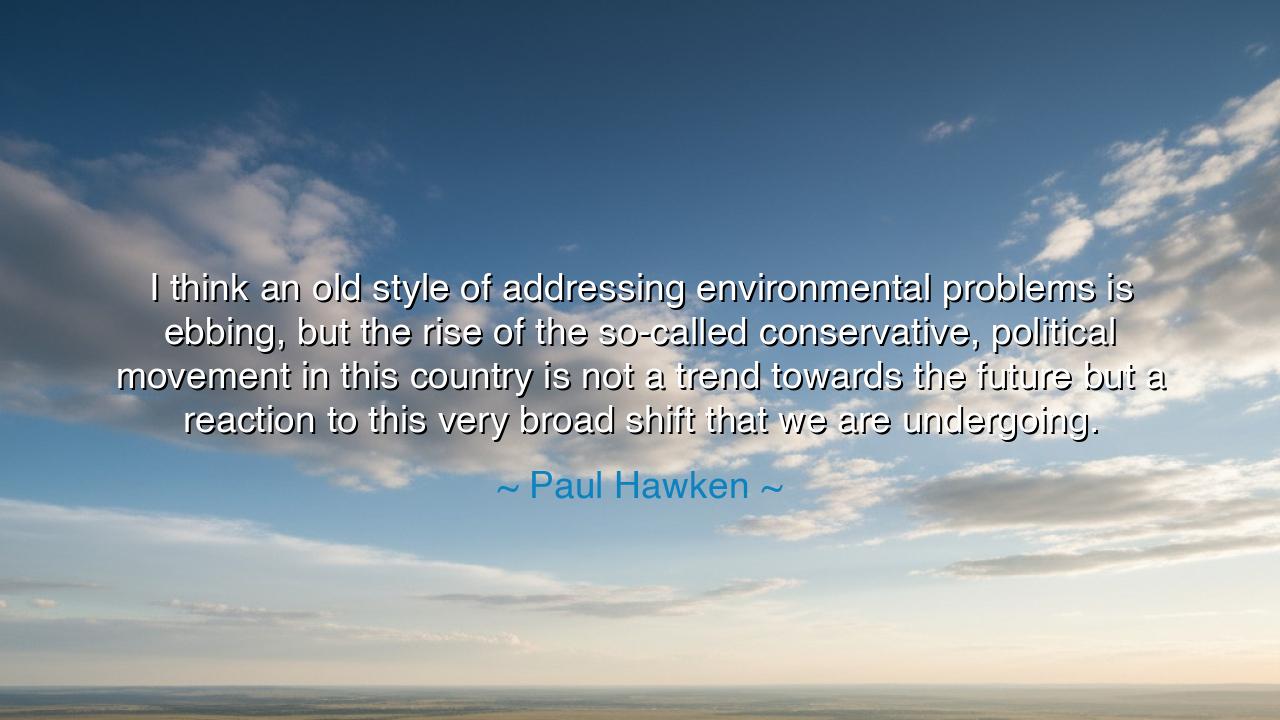
I think an old style of addressing environmental problems is
I think an old style of addressing environmental problems is ebbing, but the rise of the so-called conservative, political movement in this country is not a trend towards the future but a reaction to this very broad shift that we are undergoing.






Paul Hawken, a voice of clarity in the storm of modern change, once declared: “I think an old style of addressing environmental problems is ebbing, but the rise of the so-called conservative political movement in this country is not a trend towards the future but a reaction to this very broad shift that we are undergoing.” His words are not casual observation but prophetic counsel, a recognition that human society stands at a threshold. What is passing away is the outdated way of confronting crises with denial or delay. What is rising is not yet the full dawn of a new age, but the resistance of those who fear the tide of transformation.
The meaning of this statement is layered with wisdom. Hawken sees that the battle for the earth is not fought only in forests, oceans, or skies, but also in hearts and in politics. The “old style” of addressing environmental problems—piecemeal, half-hearted, ignoring deeper causes—is fading, because reality itself forces its end. Floods, droughts, fires, and poisoned air reveal that superficial solutions cannot hold back disaster. Yet as new ideas and movements emerge to confront the crisis, opposition too rises—not as progress, but as reaction, a clinging to the past as the future presses forward.
The origin of this thought lies in Hawken’s lifelong work as an environmentalist, entrepreneur, and writer. He has long warned that humanity faces not isolated issues, but systemic ones—that the earth itself is groaning under human excess, and that the true solutions require transformation of business, culture, and spirit. His words here are spoken in the context of political struggle, where conservative movements resist change not because they point to a better path, but because they fear the upheaval demanded by reality. Hawken thus frames the clash not as future versus future, but as future versus the refusal to leave the past.
History bears witness to this pattern. Consider the Industrial Revolution. As machines rose and cities swelled, pollution choked rivers and blackened skies. Some sought to deny the problem or defend the status quo, resisting reforms such as sanitation systems or labor protections. Yet change came regardless, for disease, filth, and unrest made denial impossible. Those who resisted were not pointing to the future, but holding fast to a crumbling past. Just so, Hawken warns, the resistance to environmental reform today is not visionary, but reactionary, destined to fade as the shift toward sustainability grows stronger.
There is something deeply emotional in his words, for they remind us that struggle is natural when great change arrives. Just as the tide draws back before a mighty wave, so too does resistance often swell before transformation. The rise of reactionary politics is not a sign of permanent defeat, but of a final struggle against the inevitable. Hawken offers not despair but reassurance: that the broad shift toward environmental awareness is real, is growing, and will outlast the fear and denial that temporarily oppose it.
To future generations, this teaching is both warning and encouragement. The warning is that opposition to truth will always appear, dressed in the garments of tradition or convenience. The encouragement is that such opposition does not last, for reality itself cannot be denied. Fires, storms, and melting ice care nothing for political debates; they will demand response whether leaders are ready or not. Thus the momentum of history belongs not to those who resist change, but to those who adapt with courage and vision.
The lesson is clear: do not be disheartened by the noise of resistance. When you see voices raised against sustainability, know that these are the last cries of an old order, struggling against the dawn. In your own life, embrace the shift—live simply, honor the earth, support leaders and movements that face problems with honesty rather than denial. Practically, this means reducing waste, choosing clean energy, and lending your strength to collective efforts that heal rather than harm. For the wave of change is rising, and each soul must decide whether to stand against it in vain or to ride with it into the future.
Thus Paul Hawken’s words endure as torchlight on a dark path: “The old style is ebbing… the rise of reaction is not the future, but the resistance to the shift we undergo.” Let us hear them as a summons to courage. For the future belongs not to those who clutch at the past, but to those who walk forward in wisdom, humility, and reverence for the earth that sustains us.






AAdministratorAdministrator
Welcome, honored guests. Please leave a comment, we will respond soon